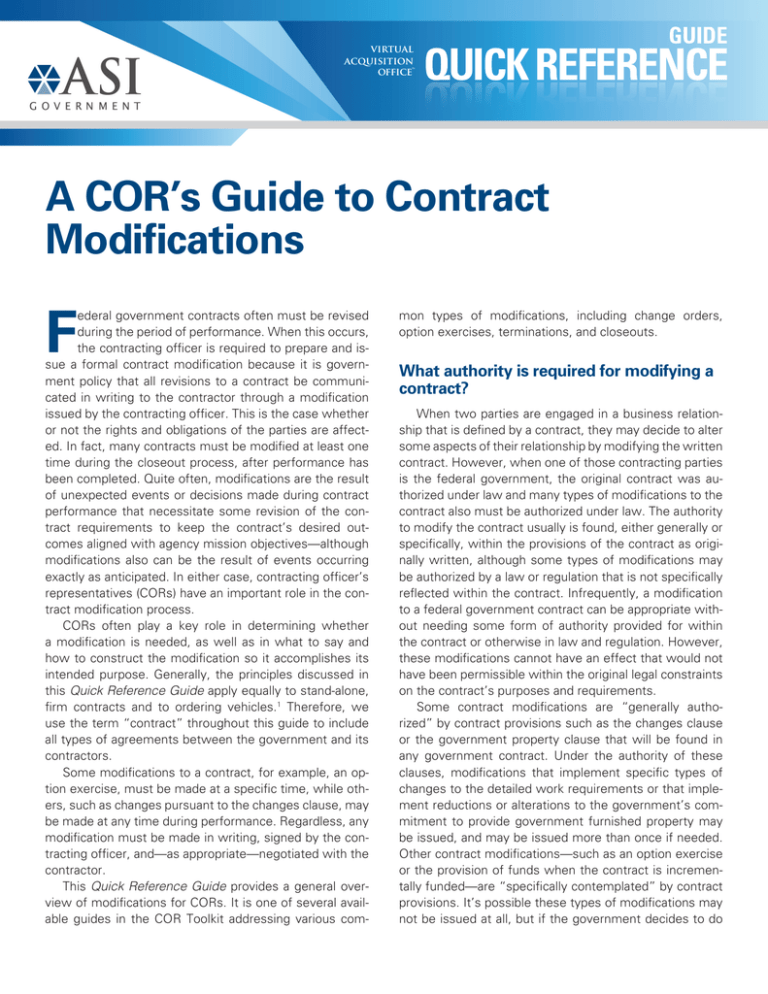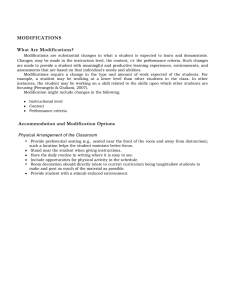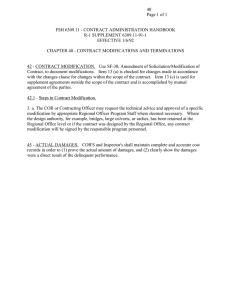
virtual
acquisition
office™
A COR’s Guide to Contract
Modifications
F
ederal government contracts often must be revised
during the period of performance. When this occurs,
the contracting officer is required to prepare and issue a formal contract modification because it is government policy that all revisions to a contract be communicated in writing to the contractor through a modification
issued by the contracting officer. This is the case whether
or not the rights and obligations of the parties are affected. In fact, many contracts must be modified at least one
time during the closeout process, after performance has
been completed. Quite often, modifications are the result
of unexpected events or decisions made during contract
performance that necessitate some revision of the contract requirements to keep the contract’s desired outcomes aligned with agency mission objectives—although
modifications also can be the result of events occurring
exactly as anticipated. In either case, contracting officer’s
representatives (CORs) have an important role in the contract modification process.
CORs often play a key role in determining whether
a modification is needed, as well as in what to say and
how to construct the modification so it accomplishes its
intended purpose. Generally, the principles discussed in
this Quick Reference Guide apply equally to stand-alone,
firm contracts and to ordering vehicles.1 Therefore, we
use the term “contract” throughout this guide to include
all types of agreements between the government and its
contractors.
Some modifications to a contract, for example, an option exercise, must be made at a specific time, while others, such as changes pursuant to the changes clause, may
be made at any time during performance. Regardless, any
modification must be made in writing, signed by the contracting officer, and—as appropriate—negotiated with the
contractor.
This Quick Reference Guide provides a general overview of modifications for CORs. It is one of several available guides in the COR Toolkit addressing various com-
mon types of modifications, including change orders,
option exercises, terminations, and closeouts.
What authority is required for modifying a
contract?
When two parties are engaged in a business relationship that is defined by a contract, they may decide to alter
some aspects of their relationship by modifying the written
contract. However, when one of those contracting parties
is the federal government, the original contract was authorized under law and many types of modifications to the
contract also must be authorized under law. The authority
to modify the contract usually is found, either generally or
specifically, within the provisions of the contract as originally written, although some types of modifications may
be authorized by a law or regulation that is not specifically
reflected within the contract. Infrequently, a modification
to a federal government contract can be appropriate without needing some form of authority provided for within
the contract or otherwise in law and regulation. However,
these modifications cannot have an effect that would not
have been permissible within the original legal constraints
on the contract’s purposes and requirements.
Some contract modifications are “generally authorized” by contract provisions such as the changes clause
or the government property clause that will be found in
any government contract. Under the authority of these
clauses, modifications that implement specific types of
changes to the detailed work requirements or that implement reductions or alterations to the government’s commitment to provide government furnished property may
be issued, and may be issued more than once if needed.
Other contract modifications—such as an option exercise
or the provision of funds when the contract is incrementally funded—are “specifically contemplated” by contract
provisions. It’s possible these types of modifications may
not be issued at all, but if the government decides to do
Quick Reference Guide
so, the appropriate modification will be issued when a
specific event occurs or, more often, on or before a specified date that has been defined in and authorized by the
specific contract provision.
Who may modify a contract?
Only a warranted contracting officer may act on behalf
of the federal government by signing a contract modification. No other government official or employee may modify a government contract or should act as if they have
the authority to do so. This is a particularly important issue for CORs, who have authority under a contract that
a contractor must recognize and heed, i.e., CORs monitor, enforce, and assess performance and in some limited
instances interpret contracts under their cognizance—but
they are NOT authorized to modify the terms, conditions,
or requirements of a contract.
Are there different types of modifications?
Yes. Contract modifications may be either unilateral or
bilateral. As the two different terms indicate, a unilateral
(one-sided) modification is one that only the contracting
officer signs, while a bilateral (two-sided) modification is
one that is signed by both the contracting officer and an
authorized corporate official on behalf of the contractor.
Since a contract is a bilateral agreement between the par-
ties, ordinarily both parties must agree in writing to revise
their agreement. However, the contracting officer is authorized to take certain actions unilaterally, as stated within the contract, i.e., actions that the contractor has already
agreed to the contracting officer taking. In addition, the
contracting officer may execute some minor “administrative changes” unilaterally, such as to correct inadvertent
errors in preparing the contract as awarded. Modifications
that the government has the right to issue unilaterally may
be issued bilaterally instead, and it often is prudent to do
so to minimize the chances of confusion. The most prominent example of when it may not be prudent to seek bilateral signature is in the case of terminations.
The contractor is never authorized to issue any form of
modification unilaterally.
What is a “new procurement”
modification?
In rare circumstances, an emergent requirement falls
within the general scope of an existing contract but exceeds specific limits tied to the scope of the requirements
authorized by the original award. For supply contracts, an
example might be an emergent need for 5 additional units
when the initial requirement that was competed was for
75 and all units have similar delivery timeframes. In such
circumstances, it may be justifiable to add the 5 units to
the existing procurement rather than compete the require-
Table 1: Unilateral versus Bilateral Modifications
Unilateral Modification
Bilateral Modification
Contracting officer signs — FAR 43.103(a)
Contracting officer and contractor sign — FAR 43.103(b)
General purpose: exercises an existing contract right or revises
information that does not affect parties’ substantive rights
General purpose: revises terms/conditions within the “general
scope” of the contract to revise the parties’ agreed obligations
Types of Unilateral Modifications:
Types of Bilateral Modifications:
Exercise options
Definitize letter contracts
Issue change orders under the changes clause of the contract
Make negotiated equitable adjustments resulting from the issuance
of a change order
Implement revisions to government-furnished property per the
government property clause, extend stop work order or suspension
of work (construction/architect-engineering)
Make negotiated equitable adjustments for government-furnished
property revision, after a suspension of work is removed, for government delay, etc.
Effect terminations
Reflect other agreements revising or modifying terms/conditions
that both parties agree to, includes new procurement/ceiling increases, if supported by authorizing documents
Implement “administrative change,” a change that does not affect
the substantive rights of the parties (e.g., a change in paying office
or appropriation data) — FAR 43.101
All changes under commercial item contracts
2
ASI GOVERNMENT
Quick Reference Guide
ment. However, these 5 units constitute a “new procurement” that was not contemplated—or included—when
the original requirement was competed. As such, either
the new requirement must be procured via competition
like the original requirement or a written justification to
procure that specific requirement on a “sole source” basis from that contractor must be approved in accordance
with the Federal Acquisition Regulation (FAR) and agency
procedures. If authorization for a sole source procurement
of the emergent requirement is approved, the requirement may be added to the existing contract rather than
issuing a whole new contract.
For a services contract, particularly for most types of
ordering vehicles or a time and materials/labor hour contract, an increase in the stated ceiling value usually will
be considered to a new procurement. In such a case, it
is the contracting officer’s decision whether to consider
a new procurement modification versus a competitive acquisition and, depending on the value of the requirement
as well as agency policy and procedures, approval of the
sole source justification often will need to be obtained at a
level significantly above the contracting officer. The COR
will have a key role in supporting the contracting officer
throughout the process of considering, justifying, and obtaining approval of a new procurement modification.
When are contract modifications effective?
In general, with two termination-related exceptions
specified in the FAR, contract modifications are effective
on the date they are signed by the contracting officer, unless the modification itself states otherwise. The FAR prescribes that contract modifications are issued via Standard
Form (SF) 30, which specifies which contract is being modified (Blocks 10A and 10B) and the effective date (Block 3),
which the contracting officer may use to specify a separate
effective date from the date of his/her signature. This technique often is used when an option exercise modification
is issued for agency convenience in advance of the start
date of the option period of performance.
When an ordering vehicle, such as an
indefinite-delivery indefinite-quantity contract, already has had orders issued, should
the vehicle be modified or the orders?
Each must be modified separately. Modification of an
indefinite-delivery, indefinite-quantity (IDIQ) contract or a
blanket purchase agreement (BPA) does not in any way alter any orders that already have been issued. By the same
token, no modification(s) to any task/delivery orders have
any impact on the ordering vehicle. Also, a modification to
one order has no impact on any other order. If the same
revision is desired to be issued against multiple orders,
it may be possible for the contracting officer to craft one
document that separately cites each affected order, but
the document will be, in effect, a modification of each of
the separate orders—and must be clearly identified as
such. This single document will then be filed separately in
each order’s official contract file.
What is the COR’s role with respect to
contract modifications?
• Understand the terms and conditions of the contract.
The COR must fully understand what the contract says
and requires of both the contractor and the government
and remain aware of the approach of key events, such
as required option exercise dates or incremental funding
needs.
• Be the government’s principal “eyes and ears” with
respect to the contract’s requirements and how they are
being performed. As the COR monitors performance and
communicates often with the contractor to ensure desired
outcomes are being achieved, he/she can discern if revisions may be necessary or desirable. From this knowledge,
the COR may well be the first to recognize the potential or
actual need for a contract modification.
• Communicate often with the contracting officer. If necessary, the COR should identify actual and potential issues
that may be addressed by contract modifications or other
written direction from the contracting officer and then support the contracting officer in making the decision, as well
as with the modification development and execution processes.
• As option exercise dates or events such as incremental funding requirements approach, help with preparation
and coordination of internal documentation. This includes
obtaining/coordinating funds and support to the preparation and approval processes of required justifications to
ensure the government meets its contractual obligations
and receives needed services or supplies.
• Assist the contracting officer by helping to assess and
negotiate any cost/price or schedule impact/equitable adjustments associated with changes and other modifications.
♦
ASI GOVERNMENT 3
Quick Reference Guide
Endnotes
1. “Ordering vehicles” includes any vehicle against which task and/or delivery orders may be placed, such as an indefinite-delivery, indefinite-quantity
contract (IDIQ) or a blanket purchase agreement (BPA).
Other Relevant ASI Government Resources
ASI Government Quick Reference Guide (January 9, 2011):
“A COR’s Guide to Contract Change Orders”
ASI Government Quick Reference Guide (January 9, 2011):
“A COR’s Guide to Options”
ASI Government Quick Reference Guide (December 30, 2010):
“A COR’s Guide to Unauthorized Commitments and Ratifications”
ASI Government Quick Reference Guide (September 15, 2011):
“A COR’s Guide to Terminations”
Viewable on the Virtual Acquisition Office™ (VAO) Web site (www.GoToVAO.com) under “Publications”
The Quick Reference Guide for CORs provides a summary overview of a key topic in acquisition, with a focus on the COR
perspective.
The Quick Reference Guide is published as part of the Virtual Acquisition Office™ subscription service, made available by ASI
Government, 1655 North Fort Myer Drive, Suite 1000, Arlington, VA 22209, 703-253-6300, fax 703-253-6301, www.GoToVAO.
com. Information and opinions are based on best available information, but their accuracy and completeness cannot be guaranteed. Layout by Julie Olver. Contents ©2013 by ASI Government. All rights reserved.
4
ASI GOVERNMENT



